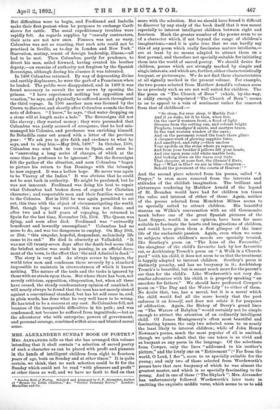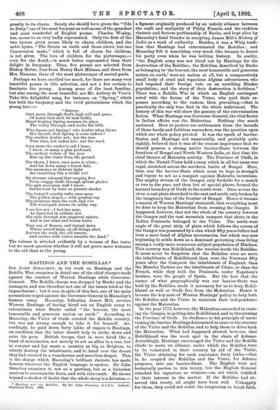MRS. ALEXANDER'S SUNDAY BOOK OF POETRY.* Mae. ALEXANDER tells us
that she has arranged this volume intending that it shall contain "a selection of sacred poetry of such a character as can be placed with profit and pleasure in the hands of intelligent children from eight to fourteen years of age, both on Sunday and at other times." It is quite certain, we think, that no such selection could be fit for the Sunday which could not be read "with pleasure and profit" at other times as well, and we have no fault to find on that • Sunday Book of Poetry. Selected and Arranged by 0. F. Alexander, Author of "Hymns for Little Children," itc. "Golden Treasury Series." London : 'Xan"ll'and Co.
score with the selection. But we should have found it difficult to discover by any study of the book itself that it was meant especially to interest intelligent children between eight and fourteen. Much the greater number of the poems seem to us of a character which, if not beyond the range of children's imaginations,—and it is quite true that we can hardly say this of any poem which really fascinates mature intellects,— are at least by no means adapted to attract them on a.
first perusal, and therefore not specially suitable for initiating them into the world of sacred poetry. We should desire for children, poems which are strongly marked by simple and single interests, and which are, further, either characteristically buoyant, or picturesque. We do not find these characteristics at all signally marked in the present volume. For example, the two poems selected from Matthew Arnold's volumes seem to us precisely such as are not well suited for children. The fine poem on "The Church of Brou " (which, by-the-way, is oddly enough misprinted "The Church of Bern ") seems. to us to appeal to a vein of sentiment rather far removed. from that of childhood :—
" So sleep, for ever sleep, 0 Marble Pair ! And if ye wake, let it be then, when fair, On the earv'd western front, a flood of light Streams from the setting sun, and colours bright Prophets, transflgued saints, and martyrs brave, In the vast western window of the nave ; And on the pavement round the tomb there glints I chequer-work of glowing sapphire tints, And amethyst, and ruby ;—then unclose Your eyelids on the stone where ye repose, And from your broider'd pillows lift your heads, And rise upon your cold white marble beds, And looking down on the warm rosy tints That chequer, at your feet, the illumin'd flints, Say= What is this P we are in bliss—forgiven- Behold the pavement of the courts of Heaven I And the second piece selected from his poems, called "
Prayer," is even more removed from the interests and attitudes of the childish imagination. The brilliant and picturesque rendering by Matthew Arnold of the legend of St. Brandan would have had for children ten times the value and interest of either of these. Again, neither of the poems selected from Monckton Manes seems to.
us specially suited to attract children. His beautiful stanzas on Wilkie's conversation with an old Geronomite monk before one of the great Spanish pictures of the Last Supper, would, in our opinion, have been far more suitable to fascinate the hearts and imaginations of children, and would have given them a first glimpse of the inner life of the eucharistic passion. Again, even when we come to subjects where children's moods are specially treated, like Southey's poem on "The Loss of the Favourite,"" the slaughter of the child's favourite lark by her favourite cat, or Archbishop Trench's poem on "A Walk in a Church- yard" with his child, it does not seem to us that the treatment is happily adapted to interest children. Southey's poem is, distinctly preachy, and has no buoyancy in it; Archbishop Trench's is beautiful, but is meant much more for the parent's ear than for the child's. Like Wordsworth's not very dis- similar adventure with his child, it is properly speaking "an anecdote for fathers." We should have preferred Cowper's poem on "The Dog and the Water-Lily" to either of them. No doubt that, too, has a moral, but it is a moral which
the child would feel all the more keenly that the poet enforces it on hintself, and does not relate it for purposes
of edification. Again, the Bishop of Derry's grand lines on "The Waters of Babylon" would certainly not be simple enough to attract the attention of an ordinarily intelligent child. Of James Montgomery's often most beautiful and fascinating hymns, the only two selected seem to us nearly the least likely to interest children; while of John Henry
Newman's poems, much the most popular of all is omitted, though we quite admit that the one taken is as vivid and as buoyant as any poem in the language. Of the selections from Cowper, only the lines "addressed to his mother's picture," and the lovely one on "Retirement" ("Far from the world, 0 Lord, I flee"), seem to us specially suitable for the young; and only two of those selected from Wordsworth's poems have that rare buoyancy of which he was almost the greatest master, and which is so specially fascinating to the young, And in one of these (" The Skylark ") Mrs. Alexander has unfortunately followed Wordsworth's later taste in omitting the exquisite middle verse, which seems to us to add
greatly to its charm. Surely she should have given the "Ode to Duty," one of the most buoyant as well as one of the grandest and most wonderful of English poems. Charles Wesley, too, seems to us very badly represented. Only the first of the two hymns given seems likely to charm children, and the noble hymn, "The Saints on earth and those above, but one Communion make," which is full of charm for children, is not given. The love of children for the picturesque,— even for the florid,—is much better represented than their delight in buoyancy. Thus, five poems are selected from Bishop Heber, four from Henry Hart Milman, and three from Mrs. Hemans, three of the most picturesque of sacred poets.
Perhaps we have cavilled too much, for there are many very beautiful poems in this selection, and not a few certain to fascinate the young. Among some of the least familiar, but also among the most beautiful, are Mr. Aubrey de Vere's. Take this delightful song, for instance, on "Spring," which has both the buoyancy and the vivid pictorialness which the young love
:-
"SPRING.
Once more, through God's high will and grace, Of hours that each its task fulfils, Heart-healing Spring resumes its place The valley through, and scales the hills.
Who knows not Spring? who doubts when blows Her breath, that Spring is come indeed ? The swallow doubts not ; nor the rose That stirs, but wakes not; nor the weed.
Once more the cuckoo's call I hear; I know, in many a glen profound, The earliest violets of the year Rise up like water from the ground.
The thorn, I know, once more is white ; And far down many a forest dale, The anemones in dubious light Are trembling like a bridal veil.
By streams released that surging flow From craggy shelf, through sylvan glades, The pale narcissus, well I know, Smiles hour by hour on greener shades.
The honey'd cowslip tufts once more The golden slopes ;—with gradual ray The primrose stars the rock, and o'er The wood-path strews its milky way.
I see her not—I feel her near, As charioted in mildest airs She sails through you empyreal sphere, And in her arms and bosom bears That urn of flowers, and lustral dews, Whose sacred balm, on all things shed, Revives the weak, the old renews.
And crowns with votive wreaths the dead."
The volume is selected evidently by a woman of fine taste, but we much question whether it will not prove more weleome to the old than to the young.



































 Previous page
Previous page